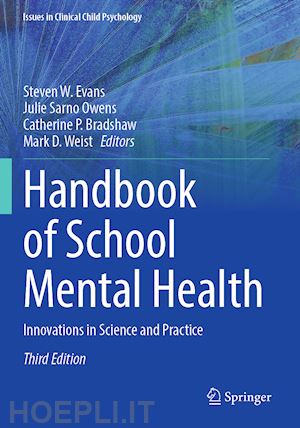
Questo prodotto usufruisce delle SPEDIZIONI GRATIS
selezionando l'opzione Corriere Veloce in fase di ordine.
Pagabile anche con Carta della cultura giovani e del merito, 18App Bonus Cultura e Carta del Docente
The handbook provides thoughtful and provocative critiques of the science and practice of school mental health. It examines intervention science and implementation science and the study of professional development and stakeholder engagement. The volume outlines the relevant issues facing the field of school mental health and provides a framework for the areas of study. Chapters critique the science in a specific area, draw innovative connections between findings, and present new information about their area of expertise. This handbook provides a concise and critical update of the literature in school mental health and is an essential resource for those from the wide range of disciplines that constitute the science and practice of school mental health.
Key topics featured include:
The handbook is an essential reference for researchers, graduate students, and other professionals in child and school psychology, special and general education, public health, school nursing, occupational therapy, psychiatry, social work and counseling, educational policy, and family advocacy.
Steven W. Evans, Ph.D., is a Distinguished Professor of Psychology and Co-Director of the Center for Intervention Research in Schools at Ohio University. Dr. Evans received his doctorate in clinical psychology from Case Western Reserve University and, before this, was an elementary school special education teacher. His research on school mental health intervention development and evaluation has been funded by a variety of federal research agencies and foundations and he has published over 200 journal articles, chapters and books. Dr. Evans has collaborated with educators, administrators, and school mental health professionals from dozens of school districts across the country to conduct this work. He is the founding editor-in-chief of the Springer journal, School Mental Health, and has co-authored multiple treatment guidelines and highly regarded reviews of best practices.
Julie Sarno Owens, Ph.D., is a Professor in the Psychology Department and Co-Director of the Center for Intervention Research in Schools (CIRS) at Ohio University. She earned her doctorate in Clinical Psychology from Purdue University and has been a faculty member at Ohio University since 2001. Dr. Owens’ program of research focuses on the development and evaluation of school-based services for youth with emotional and behavioral problems and the identification of strategies that support high quality implementation of such services. Her work has been continuously funded by local, state, and federal grants for 20 years. She has authored more than 100 journal articles and book chapters, is an Associate Editor for the journal School Mental Health, and serves on the editorial board for five journals.
Catherine Bradshaw, Ph.D., M.Ed., is a University Professor and the Senior Associate Dean for Research and Faculty Development at the School of Education and Human Development at the University of Virginia. Before her current appointment at U.Va., she was an Associate Professor and the Associate Chair of the Department of Mental Health at the Johns Hopkins Bloomberg School of Public Health, where she maintains a faculty position and codirects two prevention-focused research centers. She holds a doctorate in developmental psychology from Cornell University and a master's of education in counseling and guidance from the University of Georgia. Her primary research interests focus on the development of aggressive behavior and school-based prevention. She collaborates on research projects examining bullying and school climate; the development of aggressive and problem behaviors; effects of exposure to violence, peer victimization, and environmental stress on children; children with emotional and behavioral disorders and autism; and the design, evaluation, and implementation of evidence-based prevention programs in schools. She has led a number of federally funded randomized trials of school-based prevention programs, including Positive Behavioral Interventions and Supports (PBIS) and social-emotional learning curricula. She also has expertise in implementation science and coaching models. Dr. Bradshaw works with the Maryland State Department of Education and several school districts to support the development and implementation of programs and policies to prevent bullying and school violence, and to foster safe and supportive learning environments. She collaborates on federally funded research grants supported by the NIMH, NIMHD, NICHD, NIDA, CDC, NIJ, U.S. Department of Education, and the Institute of Education Sciences. She has published more than 325 peer-reviewed articles and chapters in edited volumes. She was previously the Associate Editor for the Journal of Research on Adolescence and is currently the editor of the journal Prevention Science and senior associate editor for Social and Emotional Learning: Research, Practice, and Policy. She is a coeditor of the Handbook of School Mental Health (Springer, 2014), the editor of Handbook on Bullying: A Life Course Perspective (2017), and the co-author of Preventing Bullying in Schools: A Social and Emotional Learning Approach to Prevention and Early Intervention (2020).
Mark D. Weist received a Ph.D. in clinical psychology from VirginiaTech in 1991 after completing his internship at Duke University, and is a Professor in the Department of Psychology at the University of South Carolina (UofSC). In 1995, with colleagues from the University of Maryland, he established the National Center for School Mental











Il sito utilizza cookie ed altri strumenti di tracciamento che raccolgono informazioni dal dispositivo dell’utente. Oltre ai cookie tecnici ed analitici aggregati, strettamente necessari per il funzionamento di questo sito web, previo consenso dell’utente possono essere installati cookie di profilazione e marketing e cookie dei social media. Cliccando su “Accetto tutti i cookie” saranno attivate tutte le categorie di cookie. Per accettare solo deterninate categorie di cookie, cliccare invece su “Impostazioni cookie”. Chiudendo il banner o continuando a navigare saranno installati solo cookie tecnici. Per maggiori dettagli, consultare la Cookie Policy.